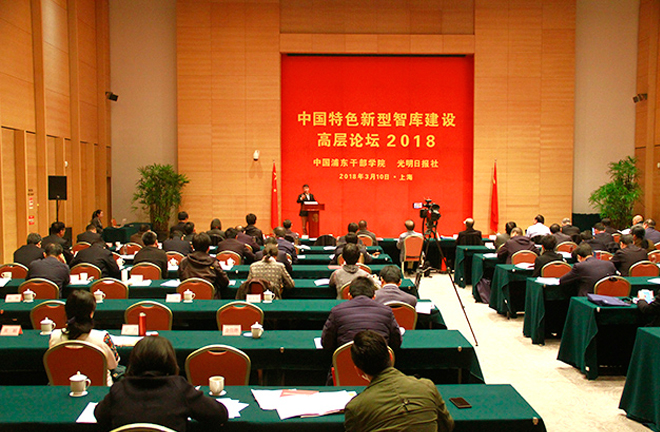Experts elaborate on new think tanks with Chinese characteristics

The High-Level Forum on the Construction of New Type of Think Tanks with Chinese Characteristics (2018) was held in Shanghai on March 10.(ZHA JIANGUO/CSST)
SHANGHAI—Chinese think tanks need to follow a path with distinctive features while learning to strengthen themselves, said experts at the High-Level Forum on the Construction of New Type of Think Tanks with Chinese Characteristics (2018) held in Shanghai on March 10.
The construction of think tanks is crucial to scientific and democratic decision-making, and it is an important component of the modernization of national governance systems and capabilities as well as a country’s soft power, said Lu Xiangao, deputy editor-in-chief of Guangming Daily.
At present, the development of China’s think tanks is still in its initial stage, said Yan Shuang, deputy director of the Publicity Department of the CPC Shanghai Committee. The growth of think tanks still requires a certain institutional environment and corresponding resource supply. There is still much room for improvement in these two aspects. It is necessary to remove obstacles to the development of institutional mechanisms by deepening reform while evaluating, managing and subsidizing think tanks with an emphasis on their core role in the process of political consultation, Yan said.
Think tanks were developed earlier in the West than in China, and Western experience and laws are worth learning from. Wang Ronghua, honorary director-general of the Center for Think Tank Studies at the Shanghai Academy of Social Sciences, said that although it is understandable to learn from Western think tanks, it is problematic to think that Chinese think tanks need to develop into something exactly like their counterparts in Europe and America on the way forward.
The development of think tanks in various countries does not have a unified path and mode to follow. Chinese think tanks should adhere to their own traditions and culture, and follow a path with Chinese characteristics under the guidance of Xi Jinping Thought on Socialism with Chinese Characteristics for a New Era, Wang said.
The construction of think tanks in the new era needs to handle four pairs of dialectical relations, Wang said. First, research done in think tanks is different but cannot be separated from academic research. Moreover, think tanks are functionally different from the internal research departments of the Party and government organizations, but they are also closely related to and well integrated with them.
Furthermore, while the operation of think tanks is different from that of enterprises, it is necessary to learn corporate governance models and marketing methods. In addition, think tanks have a different way of making their voice heard than the media, but they must cooperate with the media to complement and enhance each other.
Currently the professionalism and characteristics of China’s think tanks are not obvious, said Yang Yaqin, director of the Center for Think Tank Studies at the Shanghai Academy of Social Sciences. One important reason for this is that their research approaches are still relatively traditional. There are many cases of brainstorming by experts, but the use of new technologies is still relatively few, such as big data network platforms and artificial intelligence.
For think tanks to bring their influence into full play, certain channels are indispensable, said Wang Zhan, president of the Shanghai Federation of Social Science Associations. The influence of a think tank depends not only on its skills and professional level of helping with decision-making and consultation, but also on the channels it has. There are many ways for think tanks to advise the government and each of them has different channels. They can use the general channels of the NPC and CPPCC proposals as well as special reports, or they can use other special channels of democratic parties and the researchers’ personal connections to offer suggestions, he said.
ZHA JIANGUO and XIA LI are correspondents with Chines Social Sciences Today.
(edited by JIANG HONG)
